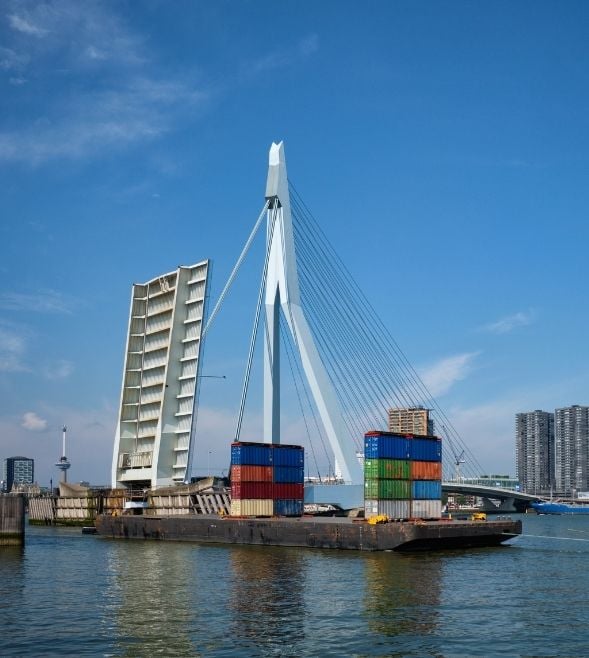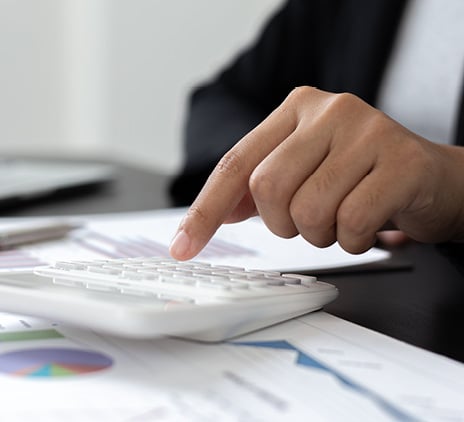-
Financial administration & outsourcing
Entrepreneurs who outsource financial administration reduce the number of administrative tasks and consequently have more time and space to focus on growth.
-
Financial insight
We help you turn financial data into valuable insights that support you in making well-founded decisions. In-depth analyses of your financial situation will help give you a better idea of where you stand and where the opportunities for growth lie, both in the short and long term.
-
Financial compliance
We make sure your company complies with financial legislation and regulations, with correct financial statements, tax reports and other obligations. From our global network, we support you in managing local and international tax risks.
-
Impact House by Grant Thornton
Building sustainability and social impact. That sounds good. But how do you go about it in the complex world of stakeholders, regulations and frameworks and changing demands from clients and society? How do you deal with important issues such as climate change and biodiversity loss?
-
Business risk services
Minimize risk, maximize predictability, and execution Good insights help you look further ahead and adapt faster. Whether you require outsourced or co-procured internal audit services and expertise to address a specific technology, cyber or regulatory challenge, we provide a turnkey and reliable solution.
-
Cyber risk services
What should I be doing first if my data has been kidnapped? Have I taken the right precautions for protecting my data or am I putting too much effort into just one of the risks? And how do I quickly detect intruders on my network? Good questions! We help you to answer these questions.
-
Deal advisory
What will the net proceeds be after the sale? How do I optimise the selling price of my business or the price of one of my business activities?
-
Forensic & integrity services
Do you require a fact finding investigation to help assess irregularities? Is it necessary to ascertain facts for litigation purposes?
-
Valuations
Independent and objective valuations tailored for mergers, acquisitions, and legal matters.
-
Auditing of annual accounts
You are answerable to others, such as shareholders and other stakeholders, with regard to your financial affairs. Financial information must therefore be reliable. What is more, you want to know how far you are progressing towards achieving your goals and what risks may apply.
-
IFRS services
Financial reporting in accordance with IFRS is a complex matter. Nowadays, an increasing number of international companies are becoming aware of the rules. But how do you apply them in practice?
-
ISAE & SOC Reporting
Our ISAE & SOC Reporting services provide independent and objective reports on the design, implementation and operational effectiveness of controls at service organizations.
-
International corporate tax
The Netherlands’ tax regime is highly dynamic. Rules and the administrative courts raise new challenges in fiscal considerations on a nearly daily basis, both nationally and internationally.
-
VAT advice
VAT is an exceptionally thorny issue, especially in major national and international activities. Filing cross-border returns, registering or making payments requires specialised knowledge. It is crucial to keep that knowledge up-to-date in order to respond to the dynamics of national and international legislation and regulation.
-
Customs
Importing/exporting goods to or from the European Union involves navigating complicated customs formalities. Failure to comply with these requirements usually results in delays. In addition, an excessively high rate of taxation or customs valuation for imports can cost you money.
-
Innovation & grants
Anyone who runs their own business sets themselves apart from the rest. Anyone who dares stick their neck out distinguishes themselves even more. That can be rather lucrative.
-
Tax technology
Driven by tax technology, we help you with your (most important) tax risks. Identify and manage your risks and become in control!
-
Transfer pricing
The increased attention for transfer pricing places greater demands on the internal organisation and on reporting.
-
Sustainable tax
In this rapidly changing world, it is increasingly important to consider environmental impact (in accordance with ESG), instead of limiting considerations to financial incentives. Multinational companies should review and potentially reconsider their tax strategy due to the constantly evolving social standards
-
Pillar Two
On 1 January 2024 the European Union will introduce a new tax law named “Pillar Two”. These new regulations will be applicable to groups with a turnover of more than EUR 750 million.
-
Cryptocurrency and digital assets
In the past decade, the utilization of blockchain and its adoption of a distributed ledger have proven their capacity to revolutionize the financial sector, inspiring numerous initiatives from businesses and entrepreneurs.
-
Streamlined Global Compliance
Large corporations with a presence in multiple jurisdictions face a number of compliance challenges. Not least of these are the varied and complex reporting and compliance requirements imposed by different countries. To overcome these challenges, Grant Thornton provides a solution to streamline the global compliance process by centralizing the delivery approach.
-
Private wealth services
Our Private Wealth specialists offer strategic and practical solutions. From tax advice to estate planning and financial scenarios, we make sure you make the right choices today, for tomorrow.
-
Corporate Law
From the general terms and conditions to the legal strategy, these matters need to be watertight. This provides assurance, and therefore peace of mind and room for growth. We will be pro-active and pragmatic in thinking along with you. We always like to look ahead and go the extra mile.
-
Employment Law
What obligations do you have with an employee on sick leave? How do you go about a reorganisation? As an entrepreneur, you want clear answers and practical solutions to your employment law questions. At Grant Thornton, we are there for you with clear advice, from contracts and terms of employment to complex matters such as dismissal or reorganisation.
-
Sustainable legal
At Grant Thornton, we help companies integrate sustainability into their business operations, with sustainable legal at the heart of our approach. We advise on ESG (Environmental, Social, Governance) legislation, and help draft sustainable contracts, implement HR policies, and carry out ESG due diligence in M&A transactions (Mergers and Acquisitions).
-
Pension advisory services
Are you, as business owner or employer, well prepared in terms of pension and other future facilities?
-
Global mobility services
How can you build and evolve a smart global mobility strategy, with policies and processes addressing the complex challenges of managing an international workforce?
-
Maritime sector
How can you continue to be a global leader? The Netherlands depends on innovation. It is our high-quality knowledge which leads the maritime sector to be of world class.
Import VAT
Most goods imported into the Netherlands from outside the EU are subject to VAT. The VAT will have to be paid by the importer at the time of clearing goods into the EU. Where the importation is for business purposes, then the importer may be able to reclaim the tax (subject to certain rules). However, in The Netherlands it is possible to postpone payment of import VAT to the periodic VAT return, hence no cash-flow occurs (referred to as an “import VAT deferment” or “the reverse charge VAT on import”).
Import VAT deferral
The import VAT deferral means obtaining a cash flow advantage when importing goods by reporting payable and deductible import VAT on the VAT return rather than paying import VAT on the border when goods are cleared into free circulation in the EU and deducting this VAT on the VAT return later.
A taxable person not established in the Netherlands (a ‘non-resident’) will not be able to shift the import VAT to the VAT return unless it appoints a fiscal representative.
In certain conditions, a fiscal representative is obligatory. For example, if a non-EU business effects EU distance sales in the Netherlands, then appointing a general fiscal representative is required.
How can a non-Dutch business defer import VAT?
Appointing a fiscal representative is required if a non-Dutch business wants to apply the reverse charge VAT on import (i.e. to obtain an import VAT deferral (article 23) license). Please see more details in ‘Take advantage of deferring import VAT in the Netherlands’.
Importers of Low-Value Goods into the EU can make use of IOSS—Simplified Reporting and Payment of VAT
As of July 1, 2021, all imports are subject to VAT unless the IOSS is used. The IOSS is a special scheme for reporting sales of low-value goods (consignments not exceeding 150 euros) imported from outside the EU. Under the IOSS, the importation is VAT exempt and the importer charges VAT at the point of sale to the customer and declares and pays this VAT via a monthly IOSS return.
The IOSS allows for a quick release of imported goods (“green channel” fast customs clearance) and also for a release of goods destined for customers located in other EU MSs than that of the entry of the goods in the EU.
Only low-value goods covered by IOSS can be released into free circulation in the EU Member State (MS) other than the EU MS of final destination of those goods.
Special rules for B2C supplies
Dutch local sales
When a non-Dutch business sells goods to private individuals located in the Netherlands from the stock located in the Netherlands, then:
- the supplier becomes liable to register for VAT in the Netherlands;
- the Netherlands becomes the place of supply; and
- Dutch VAT should be charged on the sales.
EU distance sales
Special requirements apply to businesses involved with so-called distance sales made within the EU, e.g. mail order and internet sales.
Registration for VAT in the Netherlands may be required where a non-established business is involved with distance selling via the Netherlands.
Distance selling occurs when a taxable supplier supplies and delivers goods from one EU MS to a customer in another EU MS who is not registered or liable to be registered for VAT. Such customers are known as non-taxable persons, and include private individuals and businesses and other organizations that are not registered for VAT (either because of their size, or the fact that they are exempt from having to register due to the nature of their activities). The common examples of distance sales are goods supplied by mail order and via the internet.
From 1 July 2021, the country-by-country thresholds of either €35,000 or €100,000 set by each EU MS for distance selling within EU have been replaced with a single pan-EU threshold of €10,000. This threshold applies to the total cross-border sales by the business across the EU (and NI) and not, as previously, on a country-by-country basis. No threshold applies for businesses who are not established in the EU or the Northern Ireland (NI) who have to register immediately when performing distance sales within the EU.
This means that when an EU/NI business (who has cross-border pan-European sales above the threshold of €10,000) or a non-EU businesses (no threshold applies) sells goods to the non-VAT registered customers located in the EU via the Netherlands (e.g. from a stock located in the Netherlands), then the supplier becomes liable to register for VAT in all EU MSs where it has customers.
OSS registration possible
Alternatively, the business could opt for online One Stop Shop (OSS). To ease the administrative burden of businesses having to register in each EU member state where they have customers, there is a new opt-in online One Stop Shop (OSS) quarterly VAT reporting and payment system. This means that businesses falling in scope of the new distance selling rules in effect from 1 July 2021 are not required to VAT register in each of the EU MS of their customers if they opt for OSS.
However, the OSS cannot be used to report local sales or intra-Community stock transfers for which local Dutch VAT registration is still required. Any sales to customers in the Netherlands are subject to Dutch VAT and should be reported in the Dutch VAT return.




